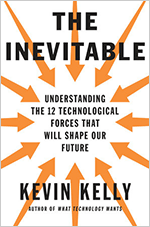
|
| Cropped image by Matthew Hurst on Flickr
|
Managing the bots that manage the business
|
This week, MIT Sloan Management Review kicks off a new series of essays by some of today's leading thinkers, who were commissioned to answer this question:
"Within the next five years, how will technology change the practice of management in a way we have not yet witnessed?"
First at bat is Tim O'Reilly, who seized the opportunity to examine today's high-tech businesses, where many workers are now managers of algorithms—the same algorithms that may, in turn, be managers of human workers. In contrast to 20th-century tech companies, where developers built to a specification, today's developers are immersed in product design and iterative, customer-focused development. As Tim explains, technology has moved out of the back office and into the forefront of the business; success requires leadership skills, collaborative work, and a design-thinking mentality. Technical know-how is rewarded, even in jobs that haven't traditionally required programming skills. And technology can be used to upskill rather than replace workers, enabling them to do jobs for which they were previously unqualified. Read Tim's essay to learn about the great management challenge of the next few decades.
+ New business models, customer experiences, and organizational structures enabled by networks, on-demand platforms, and AI are the central focus of the Next:Economy Summit 2016, taking place October 10–11 in San Francisco. Save the dates and sign up to receive program updates.
+ For a taste of the topics to be explored at the Next:Economy Summit 2016, see Tim O'Reilly in discussion with Rana Foroohar, author of Makers & Takers: The Rise and Fall of American Business and assistant managing editor at Time, where she's also the economic columnist. Don't miss this luncheon event at the World Affairs Council in San Francisco on June 28. Reserve your seat and use discount code OMForum to get a special $20 subscriber discount.
|
Corporate citizenship and the Next Economy
|
Capitalism need not conflict with concern about workers and the state of the world. As we've addressed in past issues, many rapacious companies focus on short-term stock price; they strive to enrich their founders, senior managers, and investors, deepening the economic divide while disregarding their workers...and the longer-term societal consequences. Others manage to turn a profit while treating employees well and acting on their values for the benefit of community, society, and the world. Examples of organizational structures with good corporate citizenship built in include Public Benefit Corporations and Certified B Corporations. More high-profile companies are reincorporating as Benefit Corporations or B Corps, including Kickstarter, AltSchool, Etsy, and Warby Parker. Among the most equitable new business models is platform cooperativism, a structure that enables workers to own the platform in which they participate. Here's an in-depth report on platform cooperativism by one of its leading proponents, Trebor Scholz, who teaches courses on the Internet and society at the New School. If you want to hire someone who's part of a worker-owned cooperative, there's an app for that: Coopify. Of course, even worker-owned cooperatives need money to grow, but VC funding generally comes with strings attached. One platform cooperative, New Zealand-based Loomio, chose to issue "redeemable preference shares" as a way to raise money, provide a fair return to investors, and protect its social mission. Now, perhaps, there's a better option for taking VC money without compromising values; the Foundry Group VC firm just became a Certified B Corp.
On the other hand, we continue to see young businesses beset by key social issues. In a previous issue we focused on the #AirbnbWhileBlack racial bias problem, which was borne out in this Harvard Business School study. Here's one man's personal account of trying to book a home. Not only does blatant racism persist among Airbnb hosts; the issue has reached the corporate crisis level. Just last week the company was hit with a racial discrimination lawsuit. It's one thing trying to manage homeowners in an open marketplace (though Airbnb has issued standards and expectations, including a section on fairness). It's another to address discrimination and diversity issues within your own workforce; witness Uber's refusal to release worker diversity figures. And now the New York Taxi Workers Alliance has filed a lawsuit regarding employment classification of Uber drivers in NYC.
+ In response to complaints, Airbnb is trying to be a better neighbor.
|
Farm robots: Small is beautiful
|
| When you think of robots on farms, the image that comes to mind is a huge self-driving tractor or combine plowing through massive cornfields or wheat farms in the US heartland, practically and financially out of reach for small farmers. As it turns out, small robots work best for small farms, for small farmers, for the earth, and for the economy. They weigh much less, so they don't compact the soil, and they're smaller, so they can work on more concentrated plantings. They can deal with many different kinds of produce, so they don't encourage monocropping. They're more agile, so they can work on uneven terrain, not just flat fields. And while these machines are costly, to be sure, new business models enable small farmers to employ them, whether through rent-to-own schemes, rentals from one owner in a neighborhood, or an on-demand platform. From field-worker robots to drones detecting crop readiness or problems in the field to a bean-sized sensor that can monitor moisture, temperature, and spoilage in a silo full of grain, small robots are having a big impact on the sustainability of small farming across the world.
|
How the Next Economy is taking shape in China
|
Apple's recent $1 billion investment in ride-hailing service Didi Chuxing—Apple's largest-ever investment, and the largest investment Didi Chuxing has ever received—was a clear signal that China's role in the Next Economy must be taken seriously. Just last month we learned that the eastern China city of Wuhu is working with Baidu to become the world's first driverless city, instituting not just autonomous cars, but also light-goods vans and buses. There's a connection between these two stories: China may be the nexus of the autonomous vehicle industry. Meanwhile, after a serious industrial explosion in 2014, companies in the Chinese electronics manufacturing hub Kunshan, in Jiangshu province, are rebuilding more automated factories, replacing workers with robots on a massive scale. Foxconn alone (supplier to Apple and other US companies) reduced its human labor force by 60,000 while—along with its peers—making substantial investments in AI. And the operating system of the future may already be operating in China, where the ubiquity of WeChat has removed the fragmentation and friction among the various popular apps used in the US and Europe, leaving companies looking for the "WeChat of the West." As this piece in TechCrunch explains, viewing WeChat as merely a model of conversational commerce is missing the point:
"...[P]eople who look to WeChat as a triumph of the chat interface are muddling two distinct phenomena. On the one hand, there's the emergence of an interesting new way of interacting with services through chat. On Kik, Telegram and Facebook Messenger, you can now chat with a service as if it were a friend.... On the other hand, WeChat is a replacement for the mobile operating system. Yes, chat comes first, but it's more important as the front door to a series of apps that have nothing to do with messaging."
|
Deeper reading: The Inevitable
|
 In contrast to alarmists who fear that robots will render millions of workers unemployed and AI will evolve to harm its human creators, Kevin Kelly, one of the founders of Wired magazine (and now its "senior maverick") remains firmly ensconced in the techno-optimist camp. A frequent contributor to the New York Times, the Economist, Harpers, Science, GQ, Esquire, the Wall Street Journal, and other publications, he's also the author of several books on technology, including his most recent—The Inevitable: Understanding the 12 Technological Forces That Will Shape Our Future. In it, Kelly looks out over the next 30 years to provide a road map for the future. Surveying the landscape of fast-emerging technologies and industries—including VR at home, the on-demand economy, pervasive tracking, and AI everywhere—he shows how people can adopt attitudes and behaviors that enable us not just to understand the coming changes but to leverage them for a better life. Here's a video of Kevin Kelly at SXSW talking about three of the inevitable trends he highlights in his book. In contrast to alarmists who fear that robots will render millions of workers unemployed and AI will evolve to harm its human creators, Kevin Kelly, one of the founders of Wired magazine (and now its "senior maverick") remains firmly ensconced in the techno-optimist camp. A frequent contributor to the New York Times, the Economist, Harpers, Science, GQ, Esquire, the Wall Street Journal, and other publications, he's also the author of several books on technology, including his most recent—The Inevitable: Understanding the 12 Technological Forces That Will Shape Our Future. In it, Kelly looks out over the next 30 years to provide a road map for the future. Surveying the landscape of fast-emerging technologies and industries—including VR at home, the on-demand economy, pervasive tracking, and AI everywhere—he shows how people can adopt attitudes and behaviors that enable us not just to understand the coming changes but to leverage them for a better life. Here's a video of Kevin Kelly at SXSW talking about three of the inevitable trends he highlights in his book.
|
|
|